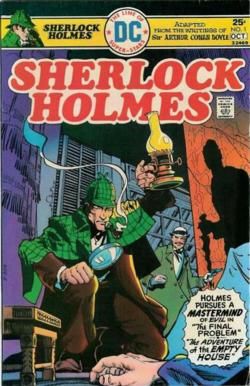Here's the latest Storytelling Engine from John Seavey. Click here to read John's description of what a Storytelling Engine IS, anyways. Check out more of them at his blog, Fraggmented.
Storytelling Engines: Sherlock Holmes
(or "The Ultimate Success")
I'm currently in the midst of reading Kelly Hale's fascinating (and undeservedly obscure) novel, "Erasing Sherlock", and it occurs to me that a large part of the reason it works so well is that the phenomenon it describes feels so real. The book, for those who haven't read it, is about a time-traveling historian who insinuates herself into the life of Holmes as a maid, in order to observe the Great Detective first-hand and discover details of his life, methods and motivations that Watson never wrote down. (Naturally, from there things Go Horribly Wrong, but I'll leave it to you to find out how. Amazon's still got it for sale...) The reason this feels so real is that large numbers of people do involve themselves in "The Great Game" of treating Watson's writings as actual accounts of a real person, analyzing and studying them with an almost obsessive fervor to learn everything they can about Sherlock Holmes...despite the fact that not only was Holmes not real, neither was Watson.
So what exactly is it that makes the Holmes canon such a magnificent storytelling engine that not only could it generate four novels and fifty-six short stories by Sir Arthur Conan Doyle, not only could it generate hosts of additional novels, short stories, TV shows and movies by authors like Kelly Hale, not only could it inspire fictional detectives like "Monk" and "House", but it could actually inspire people to treat it as though it was a genuinely non-fictional story about real people?
For starters, there's the character of Holmes himself. Doyle imbued the man with a brilliant complexity that lends astonishing verisimilitude to the stories. Holmes doesn't feel like a fictional character (and according to Doyle, was based on an actual person to some degree); he's mercurial, contradictory, displaying a full range of the moods and feelings that real human beings display (for better or worse, sometimes.) He's not exactly charming; in fact, you could make a good case that you wouldn't want to get stuck on a long train ride with the man. But he is fascinating, which is absolutely key for any character that the audience is going to be following for any length of time.
But don't underestimate the importance of Watson. For all that Holmes is the central character, Watson is as key to the series as the companion is to 'Doctor Who'. (Which reminds me, as long as I'm plugging non-canonical Holmes, if you can track down the sadly out-of-print 'All-Consuming Fire', by Andy Lane, you'll get an excellent Holmes/Doctor team-up.) Watson fulfills Holmes' emotional need to explain his brilliant deductions, but more than that, he provides a mechanism to get those deductions from Holmes' mind to the audience in a naturalistic way. A Holmes story without Watson would consist of Holmes grabbing a random man and saying, "He did it!" And where would be the fun in that?
But the final element, and the one that works the hardest to make the Holmes canon seem not just believable but actually real, is the world he operates in. Doyle set the series in what was, for him, the modern day, and grounded it in the familiar world around him. But Doyle's great gift was in bringing those details to life in ways that made them accessible even to someone who didn't live in Victorian London. To a reader picking up the Holmes series a hundred years later, Doyle paints a vivid picture of a time and place that we know to have been real, then inserts his fictional creations into them so seamlessly that it's almost impossible to find the gap. We can believe in a police plodder like Inspector Lestrade, or a matronly boarding-house owner like Mrs. Hudson, or the thousands of tiny details on everything from slum life to hansom cabs to politics that form the world Holmes operates in.
Because of that, it's small wonder that Holmes seems to have taken on a life of his own. Even when his own creator decided to kill him off once and for all, Holmes managed to survive because the audience wouldn't let him be dead. How real is he? He's got a survival instinct, that's how real he is.


